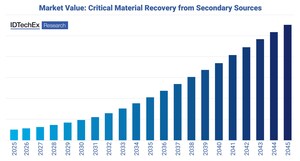BOSTON, May 17, 2024 /PRNewswire/ -- As the hunger for high-speed internet and constant connection increases, so too does the developments of 5G and 6G networks. The technology that makes this possible is happening right down in the small area of the antenna within the device, and low-loss materials and alternative substrates can offer ways of maintaining a strong connection.
5G and 6G
While 6G is still in development, it is expected to have a band of >100GHz and the ability to provide high speed internet, which will offer more opportunity and availability for crowded areas like concerts and football stadiums with its wider bandwidth. It may not be necessary when walking along a quiet street, as 5G or 4G would work just as well in less densely populated areas, but in busy places where internet connection famously slows down, 6G could bring a solution.
Multiple spectrum band services are common, including high to low bands. MmWave is very fast and offers opportunities for high-speed downloads and communications; however, it struggles to reach high coverage more than a square mile and could struggle to pass through thick walls and other physical barriers.
Mid-bands of 5G covering suburbs and cities would be the most commercialized and most popular in newer smartphones. These mid-high bands of 5G networks, although popular after the hype of being released, also face issues of signal decays due to the high frequencies at play, which packaging technologies are aiming to eradicate, and 6G network developments could experience the same problems. IDTechEx has deduced that around 50% of the 5G services offered use sub-6 GHz frequency bands because they can manage coverage and capacity more easily and are closer to commonly used 4G.
Packaging technologies and low-loss materials
Minimizing transmission losses between antenna and chips is a main focus of packaging technologies. Even though having the antenna on the printed circuit board (PCB) is cheaper, as frequencies get higher, they become more delicate, and their signal can decay as it travels across the PCB. Antenna in package (AiP) can help resolve this issue with 5G by putting the antenna much closer to the chip within a device, minimizing the distance the signal has to travel.
As 6G enters the market, it is likely that this antenna in package approach will still be useful, but the technology could improve by eventually allowing antenna on chip placement, which is more direct and eradicates almost all distance.
Low-loss materials (HDI) are materials with properties that minimize transmission loss so they don't interfere with signal as it travels, which is especially important for 5G and 6G. Low-loss materials have a high supply chain maturity and low cost and are currently popular as substrates within this industry; however, new emerging substrates could have higher performance qualities. More information on this topic can be found in IDTechEx's report, 'Low-loss Materials for 5G and 6G 2024-2034: Markets, Trends, Forecasts'.
Emerging substrates
Fan-out packaging and glass base substrates are being developed to have very thin line space features with more routing opportunities and more design flexibility to minimize signal losses. Their thinness will also make them more suitable for smartphone devices and wearables, avoiding bulky electrical components while reaching the same performance as other alternatives.
With the developments of new materials for use within electronic devices, the opportunity for fast download speed and strong connection will be available in many more places, and the availability of multiple high-speed bands will be broader, allowing for faster and more satisfying communication.
For more information, visit IDTechEx's latest report, 'Antenna in Package (AiP) for 5G and 6G 2024-2034: Technologies, Trends, Markets'.
For further independent 5G, 6G, and telecoms-related research from IDTechEx, please see www.IDTechEx.com/Research/5G. For the full portfolio of market intelligence available, including research on materials, electronics, consumer devices, wearables, thermal management, and more, please visit www.IDTechEx.com/Research. Downloadable sample pages are available for all reports.
About IDTechEx
IDTechEx provides trusted independent research on emerging technologies and their markets. Since 1999, we have been helping our clients to understand new technologies, their supply chains, market requirements, opportunities and forecasts. For more information, contact research@IDTechEx.com or visit www.IDTechEx.com.
Media Contact:
Lucy Rogers
Marketing and Sales Administrator
press@IDTechEx.com
+44(0)1223 812300
Social Media Links:
Twitter: https://www.twitter.com/IDTechEx
LinkedIn: https://www.linkedin.com/company/idtechex/
Logo: https://mma.prnewswire.com/media/478371/IDTechEx_Logo.jpg







Share this article